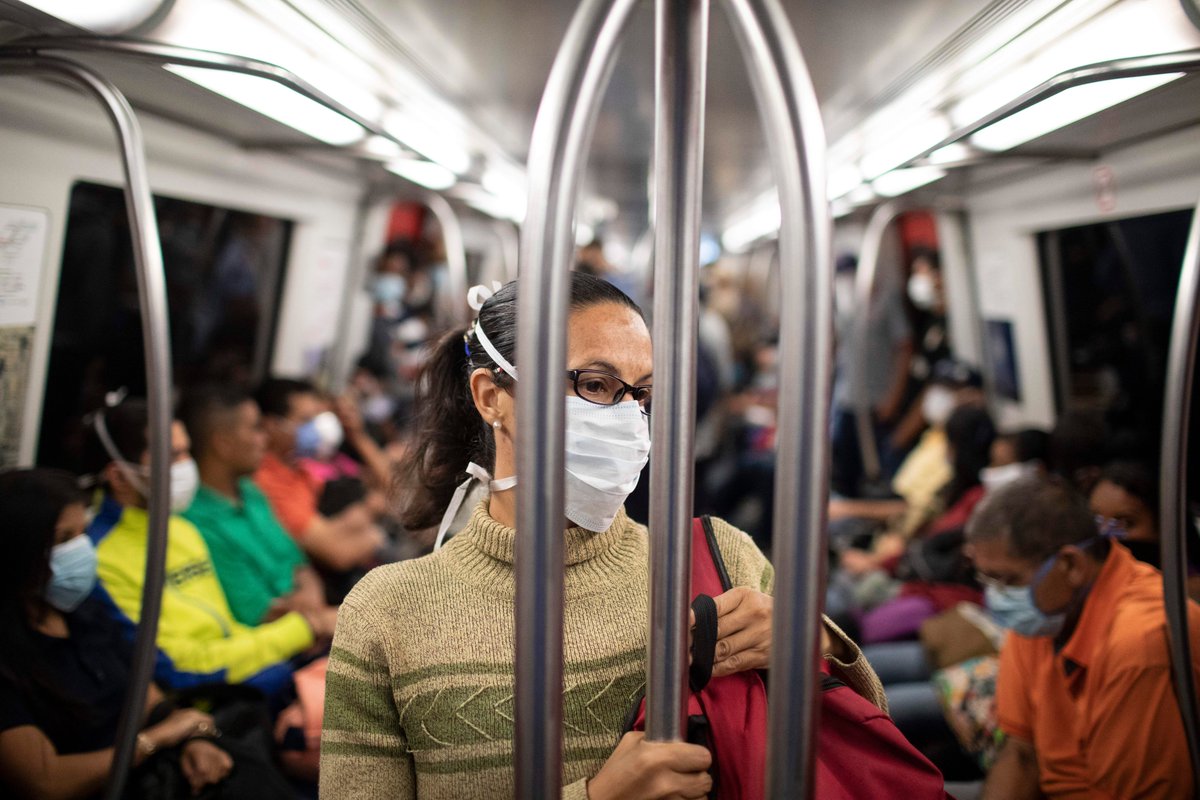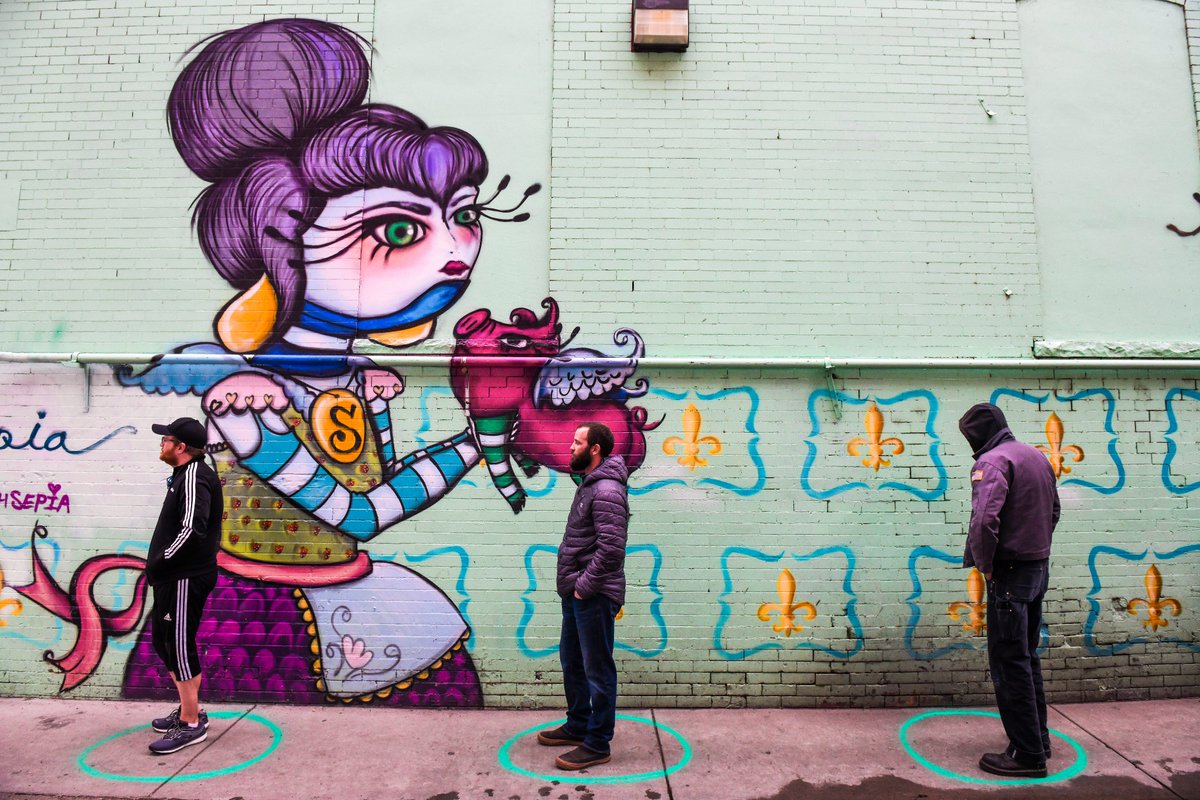Of the coronavirus’s many side effects, perhaps the least appreciated are psychological.
The pandemic is causing an epidemic of anxiety and depression, especially among young people https://trib.al/QjdVvx3 ">https://trib.al/QjdVvx3&q...
The pandemic is causing an epidemic of anxiety and depression, especially among young people https://trib.al/QjdVvx3 ">https://trib.al/QjdVvx3&q...
In the U.S., there’s been a rapid increase in the national rates of anxiety and depression in the second quarter, compared to the same period in 2019:
 https://abs.twimg.com/emoji/v2/... draggable="false" alt="📈" title="Tabelle mit Aufwärtstrend" aria-label="Emoji: Tabelle mit Aufwärtstrend">Anxiety tripled: 8.1% to 25.5%
https://abs.twimg.com/emoji/v2/... draggable="false" alt="📈" title="Tabelle mit Aufwärtstrend" aria-label="Emoji: Tabelle mit Aufwärtstrend">Anxiety tripled: 8.1% to 25.5%
 https://abs.twimg.com/emoji/v2/... draggable="false" alt="📈" title="Tabelle mit Aufwärtstrend" aria-label="Emoji: Tabelle mit Aufwärtstrend">Depression quadrupled: 6.5% to 24.3% https://trib.al/QjdVvx3 ">https://trib.al/QjdVvx3&q...
https://abs.twimg.com/emoji/v2/... draggable="false" alt="📈" title="Tabelle mit Aufwärtstrend" aria-label="Emoji: Tabelle mit Aufwärtstrend">Depression quadrupled: 6.5% to 24.3% https://trib.al/QjdVvx3 ">https://trib.al/QjdVvx3&q...
It’s the youngest adults who are suffering the most mental anguish, as studies in the U.S. and U.K. have shown.
That might seem surprising, since the virus doesn’t pose much of a danger to them https://trib.al/QjdVvx3 ">https://trib.al/QjdVvx3&q...
That might seem surprising, since the virus doesn’t pose much of a danger to them https://trib.al/QjdVvx3 ">https://trib.al/QjdVvx3&q...
Yet older adults already built their lives before the pandemic -- with routines, careers and relationships to fall back on.
The young had not, and were embarking on that adventure when Covid-19 struck https://trib.al/QjdVvx3 ">https://trib.al/QjdVvx3&q...
The young had not, and were embarking on that adventure when Covid-19 struck https://trib.al/QjdVvx3 ">https://trib.al/QjdVvx3&q...
The social lives and job-hunting networks of the youth have paused:
 https://abs.twimg.com/emoji/v2/... draggable="false" alt="🏫" title="Schule" aria-label="Emoji: Schule">Schools and universities have been shut
https://abs.twimg.com/emoji/v2/... draggable="false" alt="🏫" title="Schule" aria-label="Emoji: Schule">Schools and universities have been shut
 https://abs.twimg.com/emoji/v2/... draggable="false" alt="🌻" title="Sonnenblume" aria-label="Emoji: Sonnenblume">Summer camps aren& #39;t a thing
https://abs.twimg.com/emoji/v2/... draggable="false" alt="🌻" title="Sonnenblume" aria-label="Emoji: Sonnenblume">Summer camps aren& #39;t a thing
 https://abs.twimg.com/emoji/v2/... draggable="false" alt="🚫" title=""Betreten verboten!"-Zeichen" aria-label="Emoji: "Betreten verboten!"-Zeichen">Cancelled internships and job offers
https://abs.twimg.com/emoji/v2/... draggable="false" alt="🚫" title=""Betreten verboten!"-Zeichen" aria-label="Emoji: "Betreten verboten!"-Zeichen">Cancelled internships and job offers
 https://abs.twimg.com/emoji/v2/... draggable="false" alt="🎶" title="Mehrere Musiknoten" aria-label="Emoji: Mehrere Musiknoten">Concerts and parties are banned https://trib.al/QjdVvx3 ">https://trib.al/QjdVvx3&q...
https://abs.twimg.com/emoji/v2/... draggable="false" alt="🎶" title="Mehrere Musiknoten" aria-label="Emoji: Mehrere Musiknoten">Concerts and parties are banned https://trib.al/QjdVvx3 ">https://trib.al/QjdVvx3&q...
Zoom calls and apps don’t quite cut it. We’re like other primates who rely on physical touch to lower cortisol levels.
The result, especially for the hormonal young, is isolation and loneliness which becomes listlessness, despair and depression https://trib.al/QjdVvx3 ">https://trib.al/QjdVvx3&q...
The result, especially for the hormonal young, is isolation and loneliness which becomes listlessness, despair and depression https://trib.al/QjdVvx3 ">https://trib.al/QjdVvx3&q...
Then there’s the unprecedented uncertainty that Covid-19 has foisted on all of us.
The pandemic has called off all plans, and planning https://trib.al/QjdVvx3 ">https://trib.al/QjdVvx3&q...
The pandemic has called off all plans, and planning https://trib.al/QjdVvx3 ">https://trib.al/QjdVvx3&q...
Young or old, individuals differ in where they rank on the so-called Intolerance of Uncertainty Scale.
The less a person is able to embrace uncertainty, the more likely they are to enter worry spirals. This wreaks havoc the brain, causing severe anxiety https://trib.al/QjdVvx3 ">https://trib.al/QjdVvx3&q...
The less a person is able to embrace uncertainty, the more likely they are to enter worry spirals. This wreaks havoc the brain, causing severe anxiety https://trib.al/QjdVvx3 ">https://trib.al/QjdVvx3&q...
The spread of anxiety and depression is enough of a blight to rank alongside viral transmission as a concern. The scars will be long-term:
 https://abs.twimg.com/emoji/v2/... draggable="false" alt="🛑" title="Stop sign" aria-label="Emoji: Stop sign">Delayed learning
https://abs.twimg.com/emoji/v2/... draggable="false" alt="🛑" title="Stop sign" aria-label="Emoji: Stop sign">Delayed learning
 https://abs.twimg.com/emoji/v2/... draggable="false" alt="💔" title="Gebrochenes Herz" aria-label="Emoji: Gebrochenes Herz">Broken relationships
https://abs.twimg.com/emoji/v2/... draggable="false" alt="💔" title="Gebrochenes Herz" aria-label="Emoji: Gebrochenes Herz">Broken relationships
 https://abs.twimg.com/emoji/v2/... draggable="false" alt="💭" title="Gedankenblase" aria-label="Emoji: Gedankenblase">Abandoned dreams https://trib.al/QjdVvx3 ">https://trib.al/QjdVvx3&q...
https://abs.twimg.com/emoji/v2/... draggable="false" alt="💭" title="Gedankenblase" aria-label="Emoji: Gedankenblase">Abandoned dreams https://trib.al/QjdVvx3 ">https://trib.al/QjdVvx3&q...
Policy makers must find more money and help for those with problems.
Globally, there’s fewer than one mental-health professional for every 10,000 sufferers, most of whom get no treatment at all https://trib.al/QjdVvx3 ">https://trib.al/QjdVvx3&q...
Globally, there’s fewer than one mental-health professional for every 10,000 sufferers, most of whom get no treatment at all https://trib.al/QjdVvx3 ">https://trib.al/QjdVvx3&q...
For us as individuals, it means we need to brace ourselves, and reach out to those who might need support.
Everything still remains entirely uncertain -- the year 2020 seems to be asking all of us to deal with that https://trib.al/QjdVvx3 ">https://trib.al/QjdVvx3&q...
Everything still remains entirely uncertain -- the year 2020 seems to be asking all of us to deal with that https://trib.al/QjdVvx3 ">https://trib.al/QjdVvx3&q...

 Read on Twitter
Read on Twitter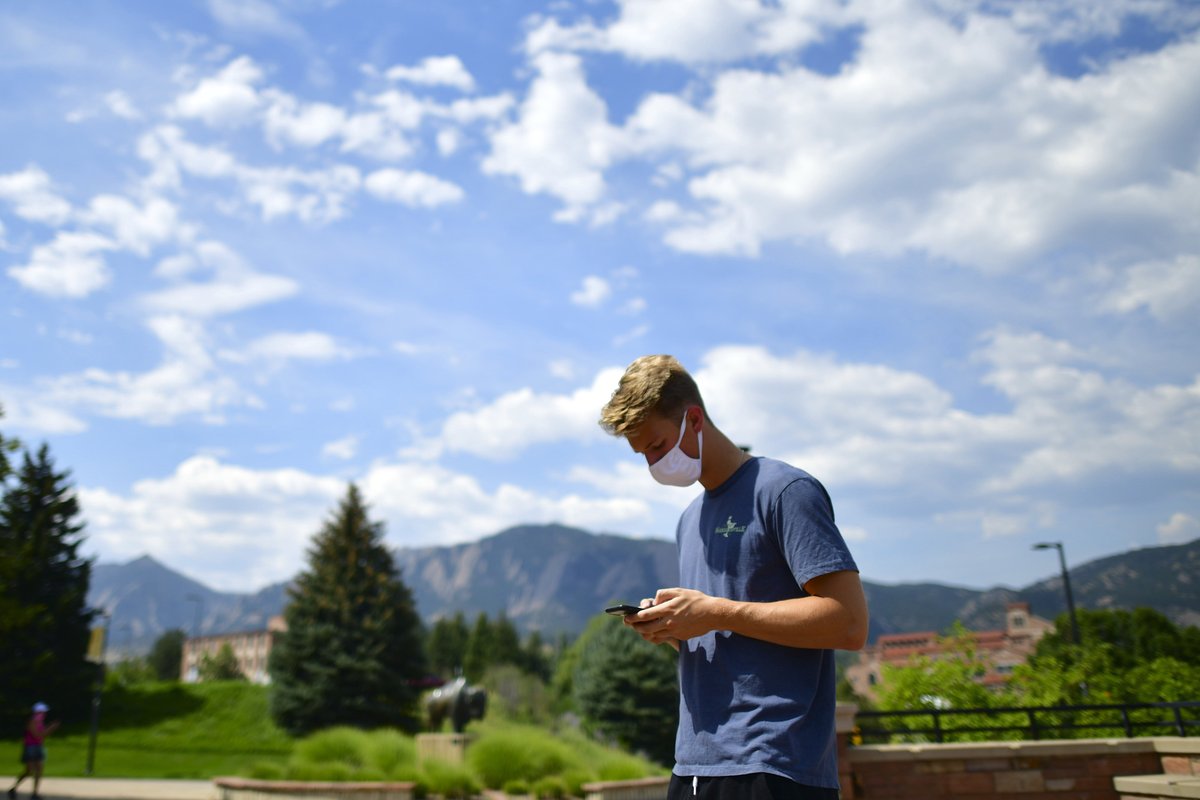 Anxiety tripled: 8.1% to 25.5%https://abs.twimg.com/emoji/v2/... draggable="false" alt="📈" title="Tabelle mit Aufwärtstrend" aria-label="Emoji: Tabelle mit Aufwärtstrend">Depression quadrupled: 6.5% to 24.3% https://trib.al/QjdVvx3&q..." title="In the U.S., there’s been a rapid increase in the national rates of anxiety and depression in the second quarter, compared to the same period in 2019:https://abs.twimg.com/emoji/v2/... draggable="false" alt="📈" title="Tabelle mit Aufwärtstrend" aria-label="Emoji: Tabelle mit Aufwärtstrend">Anxiety tripled: 8.1% to 25.5%https://abs.twimg.com/emoji/v2/... draggable="false" alt="📈" title="Tabelle mit Aufwärtstrend" aria-label="Emoji: Tabelle mit Aufwärtstrend">Depression quadrupled: 6.5% to 24.3% https://trib.al/QjdVvx3&q..." class="img-responsive" style="max-width:100%;"/>
Anxiety tripled: 8.1% to 25.5%https://abs.twimg.com/emoji/v2/... draggable="false" alt="📈" title="Tabelle mit Aufwärtstrend" aria-label="Emoji: Tabelle mit Aufwärtstrend">Depression quadrupled: 6.5% to 24.3% https://trib.al/QjdVvx3&q..." title="In the U.S., there’s been a rapid increase in the national rates of anxiety and depression in the second quarter, compared to the same period in 2019:https://abs.twimg.com/emoji/v2/... draggable="false" alt="📈" title="Tabelle mit Aufwärtstrend" aria-label="Emoji: Tabelle mit Aufwärtstrend">Anxiety tripled: 8.1% to 25.5%https://abs.twimg.com/emoji/v2/... draggable="false" alt="📈" title="Tabelle mit Aufwärtstrend" aria-label="Emoji: Tabelle mit Aufwärtstrend">Depression quadrupled: 6.5% to 24.3% https://trib.al/QjdVvx3&q..." class="img-responsive" style="max-width:100%;"/>
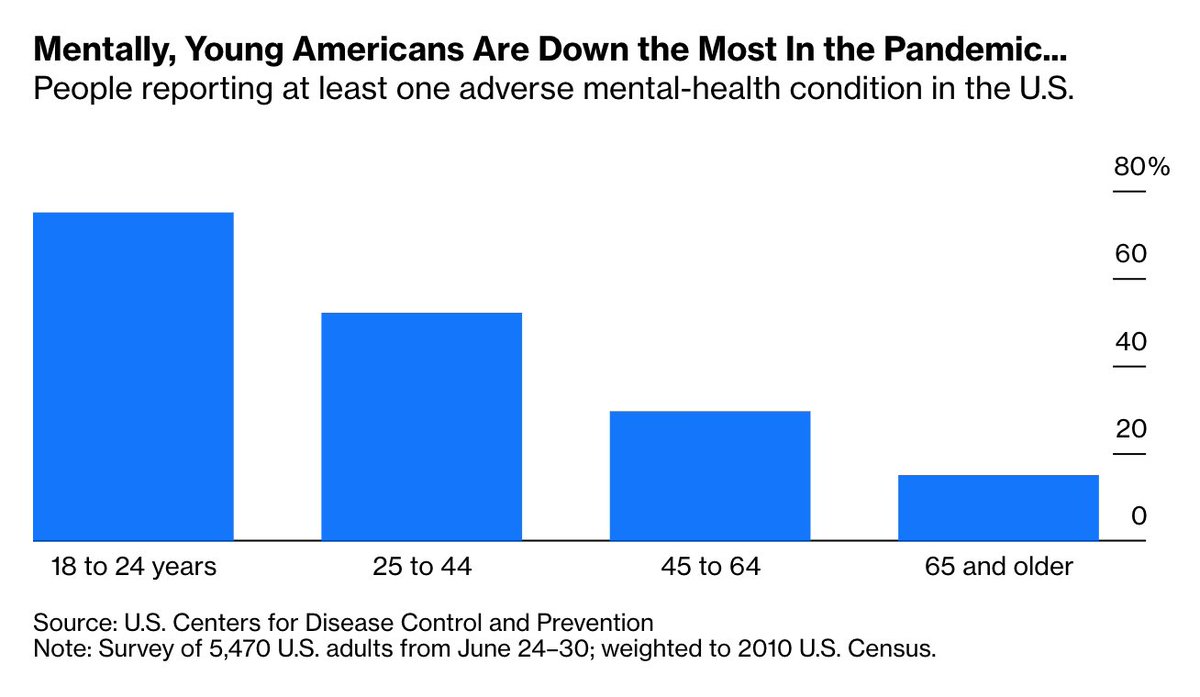
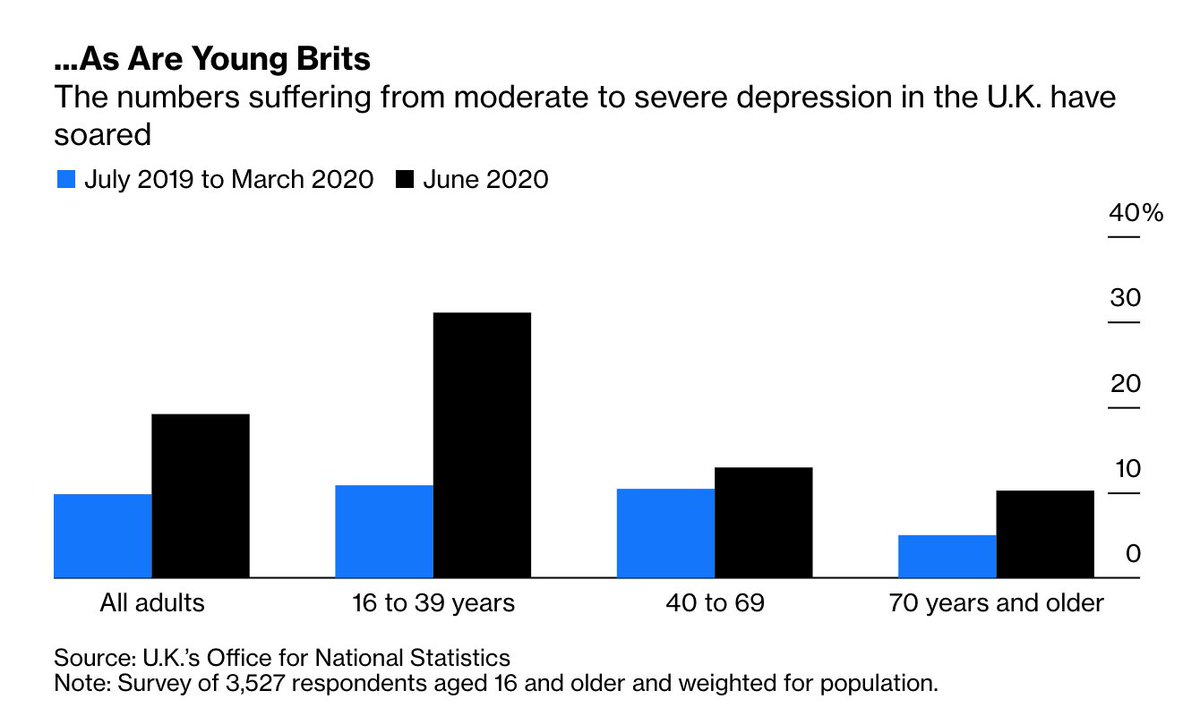

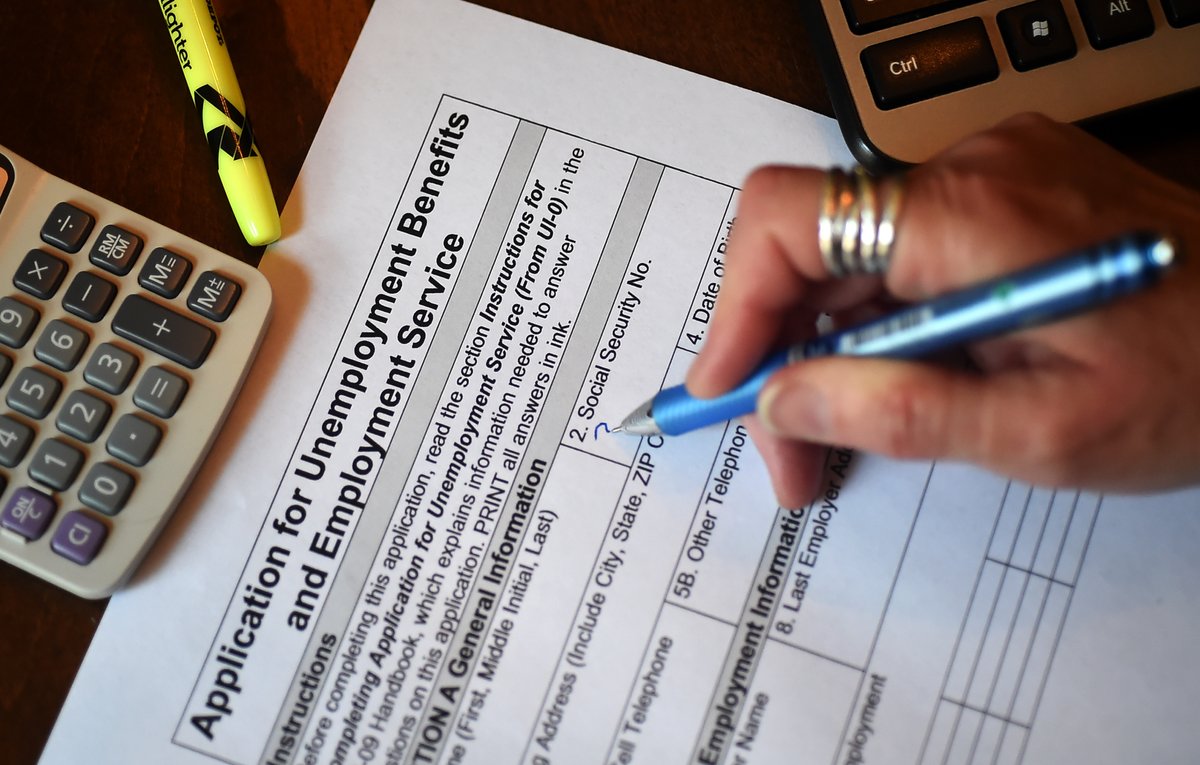 Schools and universities have been shuthttps://abs.twimg.com/emoji/v2/... draggable="false" alt="🌻" title="Sonnenblume" aria-label="Emoji: Sonnenblume">Summer camps aren& #39;t a thinghttps://abs.twimg.com/emoji/v2/... draggable="false" alt="🚫" title=""Betreten verboten!"-Zeichen" aria-label="Emoji: "Betreten verboten!"-Zeichen">Cancelled internships and job offershttps://abs.twimg.com/emoji/v2/... draggable="false" alt="🎶" title="Mehrere Musiknoten" aria-label="Emoji: Mehrere Musiknoten">Concerts and parties are banned https://trib.al/QjdVvx3&q..." title="The social lives and job-hunting networks of the youth have paused:https://abs.twimg.com/emoji/v2/... draggable="false" alt="🏫" title="Schule" aria-label="Emoji: Schule">Schools and universities have been shuthttps://abs.twimg.com/emoji/v2/... draggable="false" alt="🌻" title="Sonnenblume" aria-label="Emoji: Sonnenblume">Summer camps aren& #39;t a thinghttps://abs.twimg.com/emoji/v2/... draggable="false" alt="🚫" title=""Betreten verboten!"-Zeichen" aria-label="Emoji: "Betreten verboten!"-Zeichen">Cancelled internships and job offershttps://abs.twimg.com/emoji/v2/... draggable="false" alt="🎶" title="Mehrere Musiknoten" aria-label="Emoji: Mehrere Musiknoten">Concerts and parties are banned https://trib.al/QjdVvx3&q..." class="img-responsive" style="max-width:100%;"/>
Schools and universities have been shuthttps://abs.twimg.com/emoji/v2/... draggable="false" alt="🌻" title="Sonnenblume" aria-label="Emoji: Sonnenblume">Summer camps aren& #39;t a thinghttps://abs.twimg.com/emoji/v2/... draggable="false" alt="🚫" title=""Betreten verboten!"-Zeichen" aria-label="Emoji: "Betreten verboten!"-Zeichen">Cancelled internships and job offershttps://abs.twimg.com/emoji/v2/... draggable="false" alt="🎶" title="Mehrere Musiknoten" aria-label="Emoji: Mehrere Musiknoten">Concerts and parties are banned https://trib.al/QjdVvx3&q..." title="The social lives and job-hunting networks of the youth have paused:https://abs.twimg.com/emoji/v2/... draggable="false" alt="🏫" title="Schule" aria-label="Emoji: Schule">Schools and universities have been shuthttps://abs.twimg.com/emoji/v2/... draggable="false" alt="🌻" title="Sonnenblume" aria-label="Emoji: Sonnenblume">Summer camps aren& #39;t a thinghttps://abs.twimg.com/emoji/v2/... draggable="false" alt="🚫" title=""Betreten verboten!"-Zeichen" aria-label="Emoji: "Betreten verboten!"-Zeichen">Cancelled internships and job offershttps://abs.twimg.com/emoji/v2/... draggable="false" alt="🎶" title="Mehrere Musiknoten" aria-label="Emoji: Mehrere Musiknoten">Concerts and parties are banned https://trib.al/QjdVvx3&q..." class="img-responsive" style="max-width:100%;"/>
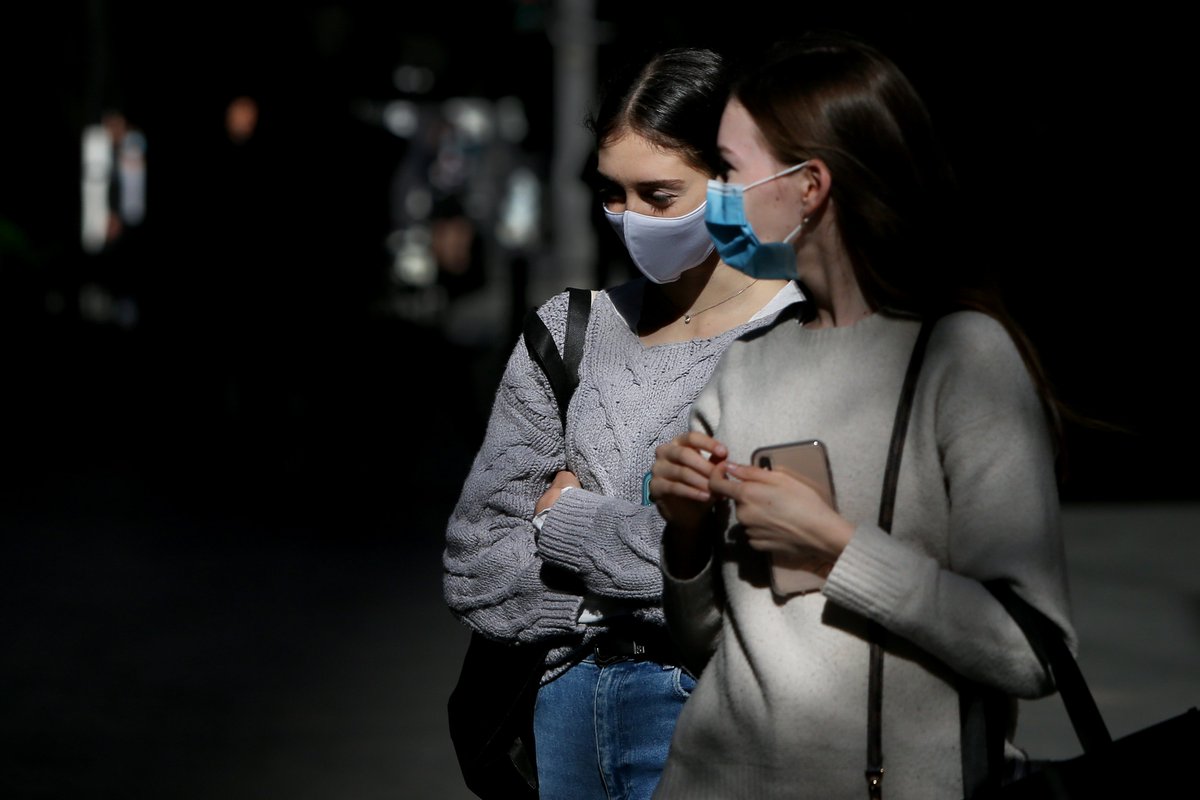
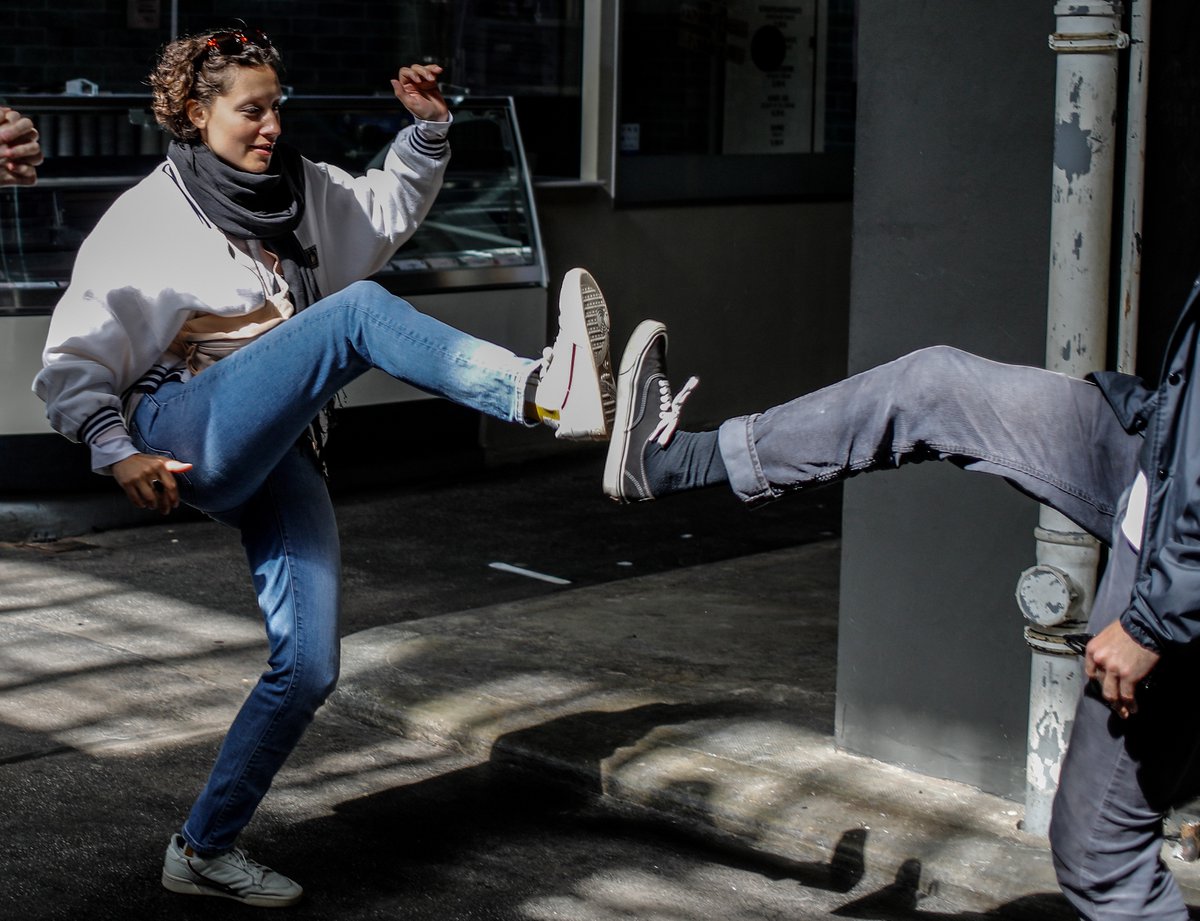

 Delayed learninghttps://abs.twimg.com/emoji/v2/... draggable="false" alt="💔" title="Gebrochenes Herz" aria-label="Emoji: Gebrochenes Herz">Broken relationshipshttps://abs.twimg.com/emoji/v2/... draggable="false" alt="💭" title="Gedankenblase" aria-label="Emoji: Gedankenblase">Abandoned dreams https://trib.al/QjdVvx3&q..." title="The spread of anxiety and depression is enough of a blight to rank alongside viral transmission as a concern. The scars will be long-term:https://abs.twimg.com/emoji/v2/... draggable="false" alt="🛑" title="Stop sign" aria-label="Emoji: Stop sign">Delayed learninghttps://abs.twimg.com/emoji/v2/... draggable="false" alt="💔" title="Gebrochenes Herz" aria-label="Emoji: Gebrochenes Herz">Broken relationshipshttps://abs.twimg.com/emoji/v2/... draggable="false" alt="💭" title="Gedankenblase" aria-label="Emoji: Gedankenblase">Abandoned dreams https://trib.al/QjdVvx3&q..." class="img-responsive" style="max-width:100%;"/>
Delayed learninghttps://abs.twimg.com/emoji/v2/... draggable="false" alt="💔" title="Gebrochenes Herz" aria-label="Emoji: Gebrochenes Herz">Broken relationshipshttps://abs.twimg.com/emoji/v2/... draggable="false" alt="💭" title="Gedankenblase" aria-label="Emoji: Gedankenblase">Abandoned dreams https://trib.al/QjdVvx3&q..." title="The spread of anxiety and depression is enough of a blight to rank alongside viral transmission as a concern. The scars will be long-term:https://abs.twimg.com/emoji/v2/... draggable="false" alt="🛑" title="Stop sign" aria-label="Emoji: Stop sign">Delayed learninghttps://abs.twimg.com/emoji/v2/... draggable="false" alt="💔" title="Gebrochenes Herz" aria-label="Emoji: Gebrochenes Herz">Broken relationshipshttps://abs.twimg.com/emoji/v2/... draggable="false" alt="💭" title="Gedankenblase" aria-label="Emoji: Gedankenblase">Abandoned dreams https://trib.al/QjdVvx3&q..." class="img-responsive" style="max-width:100%;"/>
